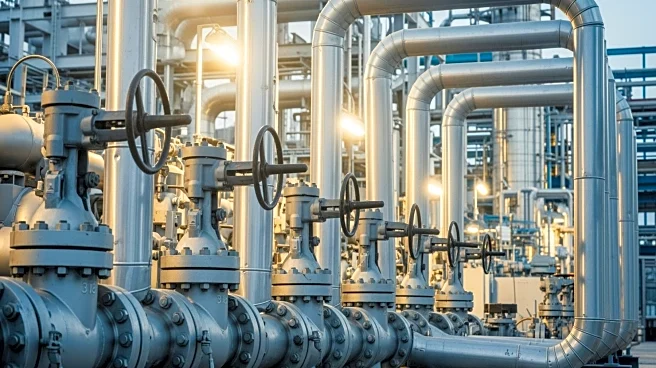What's Happening?
Dangote Industries Limited, led by President Aliko Dangote, has announced plans to expand its petroleum refinery capacity from 650,000 barrels per day to 1.4 million barrels per day. This decision is driven by emerging opportunities across Africa, increased
regional demand for cleaner fuels, and Nigeria's evolving policy environment that encourages local refining. The $20 billion facility, already the largest single-train refinery globally, aims to double its capacity within the next three years, positioning itself as a global leader in petroleum refining and a major driver of Africa's industrial renaissance. The expansion project will be financed through a mix of cash flow, public listing, and strategic investors.
Why It's Important?
The expansion of Dangote's refinery is significant for Nigeria's energy security and economic development. By increasing its refining capacity, Nigeria can reduce foreign exchange outflows and save billions of dollars annually that would otherwise be spent on importing refined products. The project is expected to generate substantial revenue, potentially exceeding $55 billion annually, making it one of Africa's most valuable industrial assets. Additionally, the expansion will enhance Nigeria's position as a global refining hub, surpassing India's Jamnagar Refinery, currently the world's largest facility. This move aligns with President Bola Ahmed Tinubu's vision for Nigeria to become a major supplier of petroleum products worldwide.
What's Next?
The expansion project is set to be completed over the next three years, with plans to increase polypropylene production capacity and transition to Euro VI fuel standards, meeting the highest global environmental benchmarks. Dangote Industries also plans to expand its power generation capacity to 1,000 megawatts, ensuring operational self-sufficiency. The company is committed to employing over 85% Nigerian workforce, investing in skills development and technology transfer, and maintaining safety, sustainability, and local participation throughout the expansion phases.
Beyond the Headlines
The expansion of Dangote's refinery could have broader implications for Africa's energy independence and economic transformation. By shifting from exporting raw crude to refining petroleum products locally, Africa can enhance its energy security and reduce dependency on foreign imports. This development may also stimulate industrial growth and create job opportunities, contributing to the continent's economic renaissance. Furthermore, the transition to Euro VI fuel standards reflects a commitment to environmental sustainability, aligning with global efforts to reduce carbon emissions and promote cleaner energy solutions.

















